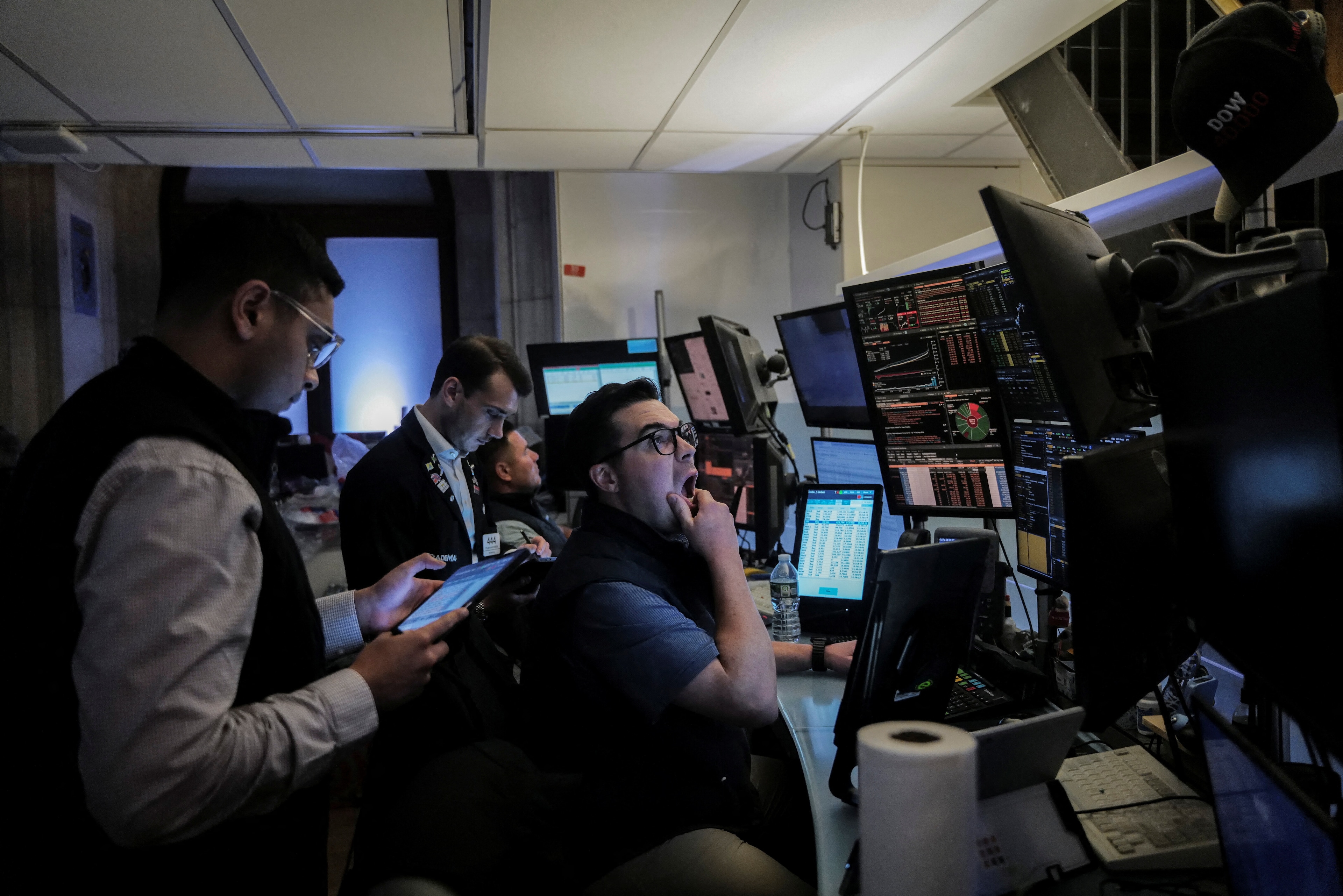A lesson from democracy’s record year: ‘vibes’ mean more to voters than GDP

Many voters seemed less focused on what an economy’s doing now, and more on what it might do in the future.
Image: REUTERS/Andres Cuenca
Stay up to date:
The Digital Economy
- 2024 was a record year for elections, and many incumbents were ousted.
- This is true even in places where headline economic indicators reflected recovery or even enviable growth – which didn’t seem to mean much to voters.
- Better ways of measuring how people actually experience growth in nominally healthy economies might be useful.
As World War Two drew to a close, the US military set out to examine the effectiveness of dropping nearly 2.7 million tons of Allied bombs on German cities. The resulting surveys revealed a curious detail: even while they were being reduced to rubble, productivity in these places often increased.
Maybe because of all that rubble. With restaurants, shops, and cafes obliterated, there hadn’t been many diversions outside of factory work available to the average urban dweller. That same urban dweller probably would have been nonplussed to learn that as a result, at least according to one key metric, their local economy was doing fine.
Differences between headline economic statistics and the ways in which economies are actually experienced aren’t always so stark. But this record year for democracy made clear that even a slight disconnect can contribute to surprising political results.
Most of the countries that held national elections in 2024 haven’t been pulverized by bombs in recent memory, yet voters let it be known that they were enduring their own sort of trauma. Call it vibeonomics, or whatever you like – it packed a punch.
In the UK, a benchmark measure of inflation was tamed before the incumbent party was nonetheless handed a crushing defeat. Japan’s longtime ruling party suffered a dramatic loss despite stable economic indicators that lured a torrent of investment. As inflation figures eased in Portugal and GDP grew, its dominant political party was humbled. And in the US, a relatively respectable loss for the incumbent party still triggered regret over touting upbeat headline figures to an electorate that, as it turns out, wasn't in the mood.
Those 2024 results carried forward a trend from the prior year. Voters in 2023 also didn’t seem so much interested in the official 'now', as much as they were dwelling on what they’d experienced recently, or what they feared might come next.
Relatively healthy official GDP growth, unemployment rate, and inflation forecasts in New Zealand? That was paired with an even more decisive loss for that country’s incumbent party in late 2023 than what was yet to come in the UK.
Of course, there are plenty of reasons to lose elections that don’t have much to do with economic indicators. But the idea that an incumbent party can still get trounced when an economy is delivering a decent report card is still relatively new.
Many of 2024’s losers were saddled with bad memories. Governments had spent a lot of money during the pandemic to protect people and maintain something like stability. That contributed to a lot of inflation. Economists think things could have been worse – though that doesn’t make for a great campaign slogan.
It’s also true that the feel of an economy can still sting even as the bigger picture starts looking better on paper.
On the eve of last month’s US presidential election, headline inflation had been reduced to 2.6%, from a high of 9.1% a couple of years earlier. But plateaued prices didn’t recede (deflation would've been yet another issue). Meanwhile higher interest rates deployed to fight inflation made it even more difficult to buy things like a car; a used model still costs nearly a third more in the US than it did at the dawn of COVID-19.
Efforts to put a number on voter misery
Similar dynamics played out in the other parts of the world, at the same time that voters experienced economic inequality significantly worse than what their parents’ generation had encountered. Political promises of a return to better times gained lustre.
There were also murkier factors at play. Some of the painful increases in the cost of food could be attributed to middlemen tacking on fees before an item even hits the shelves. Exactly how much? Hard to say. It’s just another fact of material existence that could do with some real-time calibrating.
For decades, experts have tried to come up with better measures of voters’ day-to-day economic experience. The landslide victory for incumbent US President Ronald Reagan in 1984 has been chalked up in part to the decline during his first term of something called “excess” inflation, or the amount that prices rise on average during one administration compared with the last.
A couple of decades earlier, the “misery index” had been created, by adding together a country’s headline inflation rate and rate of unemployment. The indicator’s track record is spotty; the UK’s reading had actually improved before pro-Brexit voters upended things in 2016, and so did the figure for France before a snap election there this past summer chastened the ruling party and left no one in firm control.
In the late 1990s, an updated version of the misery index added in long-term interest rates and inflation-adjusted GDP growth. A subsequent update combined unemployment rates, inflation figures, and bank-lending rates, then subtracted changes in real GDP per capita; France’s score on this did indeed worsen in the few years prior to its recent political reckoning.
Misery can mean more than a high cost of living. In the Czech Republic, an inflation spike following Russia’s invasion of Ukraine in 2022 hit at the same time as an impending energy crisis, and an influx of refugees from a country just a few hundred kilometers to the east that was fighting for its survival.
That kind of geopolitical tumult is something investors keep tabs on to protect their money. BlackRock, the biggest asset manager in the world, publishes an indicator that gauges how distracted financial markets are by global upheaval. A figure that distils the related fears of an electorate, in combination with its economic anxieties, might also be handy.
The Czech Republic has now decisively tamed inflation. Its economy is in rebound mode, and its integration of Ukrainian refugees is in many ways considered a success. Still, the country’s populist opposition party is expected to win parliamentary elections scheduled for next year; it has relied on potent innuendo about migrants, and amplified economic grievances.
The lingering effects of economic insecurity can open the door to populist messaging about unpleasant-but-necessary things that must be done to right the ship – regardless of what headline indicators are saying.
That doesn’t mean existing indicators deserve more attention. They’ve shown there’s plenty of room for improvement.
Productivity, for example, can mean almost everything for an economy, or less than nothing. Examples of “bad” productivity growth include simply losing more jobs than GDP in way that mimics efficiency, or producing more of a type of thing that can hurt people. The increased wartime productivity in a battered Germany eight decades ago, mostly focused on making weapons, probably qualifies as bad.
Productivity has stagnated in Germany lately, though that’s not particularly unique. And more prominent headline figures on the eve of the country's upcoming national election, like GDP growth and inflation, are relatively positive.
So yes, the people currently in charge there are expected to lose.
More reading on measuring the ways economies are experienced by voters
For more context, here are links to further reading from the World Economic Forum's Strategic Intelligence platform:
- Dislocation from traditional economic indicators is just one thing that can make voters unpredictable; according to this piece, the UK electorate is among those exhibiting “choice avoidance.” (The Conversation)
- Another thing traditional economic indicators don’t capture – this researcher says “the economy” for voters in the US presidential election was about values and meanings, as much as jobs and money. That meant it could be used to appeal based on a shared identity that excluded certain groups of people. (LSE)
- More than just a pretty face: TV debates helped John F. Kennedy win the US presidency, but this paper suggests he was just one of many candidates to oust an incumbent thanks mostly to economic malaise. The moral of the story: always pay heed to excess inflation. (NBER)
- Statistics like GDP are political and social constructs, according to this piece, so deciding on what to include or exclude is as “arbitrary as deciding what socks to wear.” (LSE)
- The victor in German elections slated for February seems all but certain, according to this piece. Far less certain is how he will choose between his promised tax cuts and his commitment to the country’s famed “debt brake.” (Der Spiegel)
- “The dismal science per se was not the problem.” If both major political parties in a country don’t seem to differ much on economic policy, according to this analysis, economics is replaced entirely in the minds of voters by things like religious and moral concerns. (Project Syndicate)
- If the indicator “inclusive wealth” is ever going to become a viable alternative to GDP, according to this piece, everyone needs to quit arguing and commit to a single way of measuring it. (The Conversation)
On the Strategic Intelligence platform, you can find feeds of expert analysis related to Civic Participation, Economic Progress and hundreds of additional topics. You’ll need to register to view.
Accept our marketing cookies to access this content.
These cookies are currently disabled in your browser.
Don't miss any update on this topic
Create a free account and access your personalized content collection with our latest publications and analyses.
License and Republishing
World Economic Forum articles may be republished in accordance with the Creative Commons Attribution-NonCommercial-NoDerivatives 4.0 International Public License, and in accordance with our Terms of Use.
The views expressed in this article are those of the author alone and not the World Economic Forum.
Forum Stories newsletter
Bringing you weekly curated insights and analysis on the global issues that matter.
More on Economic GrowthSee all
Chavalit Frederick Tsao
August 19, 2025
Laurel Taylor
August 18, 2025
Yufang Jia and William Jernigan
August 18, 2025
Antara Choudhury and Vivin Rajasekharan Nair
August 14, 2025
Atul Kumar
August 12, 2025








